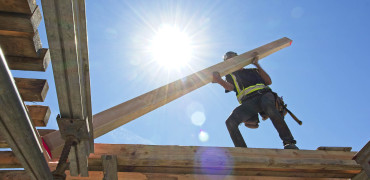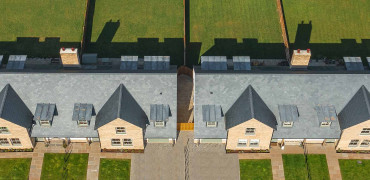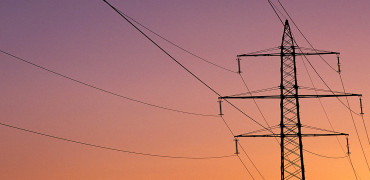What a year 2024 has been! I can hardly get my head around it to be honest.
There have been more elections across the globe this year than any other on record and this level of transition and change will always bring turbulence.
Some of the changes in power were much needed. Others have been devastating and worrying for the planet and climate change.
At the same time all these political twists and turns, changes of government, changes of policies are all happening in a world dominated by social media, which in my humble view seems to have spiralled out of control in the last few years.
It is difficult to know what is real, unreal, truth or lies. And, in the wrong hands, social media is definitely being used as a weapon, particularly by extreme factions.
We are now being flooded by a tsunami of information every day, 24 hours a day.
And let’s be honest so much of that information is pretty terrible. From the bland and boring to the negative and toxic, even the manipulated.
It is often difficult to make sense of it and most of the content is so poor I often wonder why it is even appearing on my phone.
Finding balanced, true and informative content is often difficult.
Protecting the planet cannot be popular one minute and then virtually ignored the next
War and conflict
Also, I’ve lost count of how may wars are going on in the world right now. These wars are so terrible and so frightening that I’m genuinely scared about the safety and security of the planet at moment.
With no escape from 24-hour news and it seems no escape from social media, we are surrounded by relentless ‘media noise’, negative news and everyone is battling to shout the loudest.
The problem then is that there are so many voices shouting for attention, that so many important issues are struggling to be heard.
With too much content and powerful media outlets making the all the decisions as to which cause to broadcast and prioritise over another, this means that many of us don’t even hear about some of the awful things that are happening out there.
When I say to people, “have you heard about what is happening in the devastating war in Sudan at the moment?”. They look at me with a blank face. There are mass killings, huge levels of displacement and reports of ethnic cleansing.
Even the horrific wars that do dominate our news headlines are actually difficult for us to comprehend, because we aren’t physically there, we aren’t experiencing the unbelievable devastation and loss of life first hand. We only see them through 2-dimensional screens.
The reason why I’m saying all of this (and I’m sorry if it’s depressing) is because not only is it unbelievably heartbreaking to see the world in so much conflict and turmoil, but also because our battle to save the planet is being lost amongst all the media noise and the awful tragedies so many countries are facing right now.
In many ways it is understandable. Who is thinking about saving the planet when they are simply trying to stay alive and save themselves from unbearable horrors?
And of course, our media outlets should prioritise terrible things that are happening around the world, because human life is precious.
I get all of that. But, at the same time we cannot and should not stop talking about the climate emergency.
A battle for the planet
It is so important that we acknowledge our collective battle to reverse climate change and to make sure this battle to save the planet doesn’t fall off the radar.
Over the last 10-15 years many surveys and polls would show that our No.1 priority was climate change and saving the planet.
Unfortunately, this is no longer the case. Inflation and the cost-of-living crisis and the fears of a receding economy tops most polls.
Of course, this is understandable too when people are feeling the economic stain, but it is not good that climate change is sliding down the league table of people’s priorities.
This is my big fear - reversing climate change doesn’t seem to be a priority for the developed world at the moment.
Self-interest is starting to dominate and there are even individuals, governments and political voices out there who say that spending money on climate change is not important right now.
That it is now our economic priority.
My big fear is that reversing climate change doesn’t seem to be a priority at the moment
COP a load of this
This problem was prevalent with the recent COP29 conference (United Nations Climate Change Conference) held in Baku, Azerbaijani.
I was following proceedings very closely. Most of the global media were hardly covering it.
There was very little noise coming from Baku. That was until the representatives for the Alliance of Small Island States (AOSIS) walked out of the climate talks. Then the press woke up and the world began to listen.
The statement from AOSIS said., “We cannot be expected to agree to a text which shows such contempt for our vulnerable people.”
I couldn’t agree more!
This was in response to them dismissing an offer of $250bn from richer countries to the Small Island States for them to tackle climate change. The offer on the table just wasn’t enough.
In the end it was agreed that developed nations would increase the commitment to Small Island States to $300bn per year by 2035. Note the “BY 2035”. The Small Island States are not getting the money fast!
It is also worth noting that this money isn’t actually being used for Carbon Emmision Reduction but is instead a form of pre-insurance payment for ‘Loss and Damage’ caused to the Small Islands by the defects of climate change.
The Money is to build defence systems in an attempt to prevent significant loss of life when the devastating effects of global warning really kick in in the years ahead.
It is not about preventing global warming and disaster.
A niggling problem
That responsibility, to reverse climate change and reduce global emissions is with the big, polluting, rich countries.
And rightly so. Huge, polluting countries are the problem. They have created and are accelerating global warming. They are the ones that must significantly ‘reduce their carbon emissions’, while at the same time, compensating those less wealthy and less developed countries for the significant damage we, in the developed world, are causing.
‘Carbon Emissions Reduction’ is obviously very, very important and must be done by the developed world, but I do have a niggling problem with this.
Each country announcing that it is going to reduce its ‘carbon emissions’ sounds good, but surely it should be about reducing our ’carbon consumption’ too.
There is no point in the UK becoming a zero emitting country if it is importing high volume, high carbon-emitting products from overseas.
If a country reduces its territorial carbon emissions by closing down all of its intensive energy producers, BUT THEN continues to import all of the stuff instead from other countries (who may selfishly care more about their own wealth and economic growth than the planet) then everything falls apart.
Take steel production. The UK may be reducing it’s carbon emissions when we close down our steel works in Sheffield and Wales, but that is going to make absolutely no difference to climate change whatsoever, if we buy more, carbon-intensive steel from China and then emit even more carbon by transporting it thousands of miles across the planet.
We must address carbon consumption AND carbon emissions.
Let’s be clear - climate change recognises no boundaries or international borders. The global system cannot simply shuffle carbon responsibility around the world to make itself look good.
There was very little noise coming from Baku until AOSIS walked out. Then the press woke up
The good and the bad
As ever there were positive and negative outcomes from COP. Unfortunately, for me, there were more negatives than positives.
Looking at the big picture there seems to be far too much division between countries, particularly between the powerful developed world and the less wealthy developing world.
There is definitely too much self-interest and developed, richer countries were actually accused at COP29 of being bullies.
Juan Carlos Monterey Gomez, Panama’s special representative for climate change said that the level of climate finance agreed was forced on developing nations and that low funding means the global temperature target of 1.5 degree C is dead. He said, “that means death, that means misery, for our countries”.
Mary Robinson, the former UN envoy and senior climate figure said COP29 “came very close to failure and it has ended with a disappointing deal”. She added “COP29 in Baku has been one of the most difficult COPs I can remember”.
Switzerland, a country I have a deep affection for, said COP29 fell short on meaningful ambition, and it regretted that a lot of the text in the final agreement had been watered down.
They added “we can and must do better next year”. Surely, this is a phrase we’ve heard far too many times over the years. We need to take much bigger climate emergency steps a lot faster, not crawl at a snail’s pace.
On the plus side
There were a few positives, but not many.
The big one was the $300bn announcement to Small Island States. Not enough in my view and well short of the $1.3 trillion per year by 2035 that was asked for. But $300bn is a start. Let’s take it.
There was a Carbon Market agreement on the rules underpinning carbon trading with a centralised crediting mechanism. I’m no economist, but this sounds good.
That's kind of it.
If I’m honest, I’m always disappointed by the annual cop event. It is a massive gathering, with very powerful people in attendance, but the level of division seems to border on being toxic at times with far too much national self-interest and very little revolutionary action on climate change.
It’s all too slow with a lot of greenwashing. Every year since the Paris COP21 in 2015 feels like a missed opportunity. We need to do a lot more and do it a lot faster.
Democracies are fragile. Life is fragile. But the Earth is proving to be incredibly fragile too.
The ebbs and flows of media interest
I realise that media interest in certain subject comes and goes with the rising tides.
I realise that we as human beings have different priorities at different times in order to survive.
But, protecting the planet cannot be a fashion that is very popular with us one minute and then virtually ignored the next.
Protecting the planet is vital for the future of our species. There are politicians within our own parliament who say we cannot afford to be green at the moment. We cannot be selfish and rinse the planet of everything it’s has to offer now, only for generations to suffer terribly in the future. That is a destructive path to humankind suicide.
Of course, we should relentlessly strive for global peace. But, at the same time we must do everything we possibly can to secure the future of our planet. We should never give up hope for both.
In his last message to the scouts, Sir Robert Baden-Powell said: “try to leave this world a little better than you found it”.
Wise words indeed. But all of us, together, must try harder.
George Clarke is a TV presenter, architect, writer and Ecodan Ambassador




